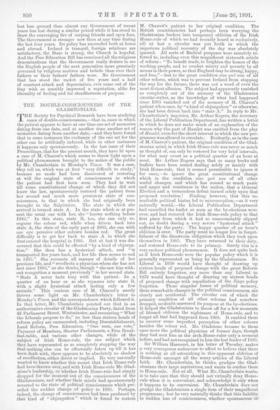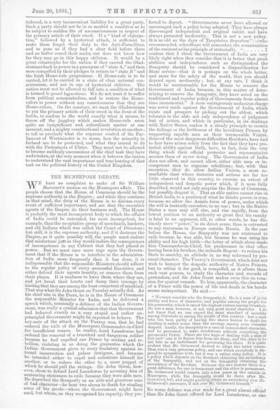THE DOUBLE-CONSCIOUSNESS OF THE GLADSTONIANS.
THE Society for Psychical Research have been studying cases of double-consciousness,—that is, cases in which the patient appears to have at one time one set of memories dating from one date, and at another time another set of memories dating from another date,—and they have found that in some instances the exchange of the one set for the other can be artificially induced, while in other instances it happens only spontaneously. In the last issue of their Proceedings, that for the present month, they have lit upon a case of M. Charcot's which seems to throw light upon a political phenomenon brought to the notice of the public by Mr. Chamberlain in Monday's Times. It was a case, they tell us, which was at first "very difficult to study," because no mode had been discovered of restoring at will the original state of consciousness in which the patient had first been seen. They had to wait till some constitutional change of which they did not know the law, spontaneously restored the patient from her second and much more persistent state of con- aciousness, to that in which she had originally been brought to the Salp(Itriere. The state in which she arrived is termed state A. In the state which is at pre- sent the usual one with her, she "knows nothing before 1885." In this state, state B, too, she can only re- cognise the colour red, while when driven back into state A, the state of the early part of 1885, she can with one eye perceive other colours besides red. The great difficulty is to get her back to state A in which she first entered the hospital in 1885. But at last it was dis- covered that this could be effected "by a kind of objurga- tion." She then has a hysterical attack, and "is transported five years back, and her life then seems to end in 1885." She recounts all manner of details of her previous life, and recollects a physician whom s'he has not met since 1886," as she thinks, though "she saw him with- out recognition a moment previously" in her second state. "State A never lasts long with this patient. In a quarter of an hour or so she repasses into state B, with a slight hysterical attack lasting only a few seconds." This curious case of M. Charcot's surely throws some light on Mr. Chamberlain's letter to Monday's Times, and the correspondence which followed it. In that letter, Mr. Chamberlain pointed out that in an authoritative circular of the Gladstonian Party, dated from 42 Parliament Street, Westminster, and recounting "What the Liberals propose to do," no less than sixteen heads of reform policy are enumerated, including Disestablishment, Land Reform, Free Education, "One man, one vote," Payment of Members, Shorter Parliaments, a Free Break- fast-table, and various other changes, while of the subject of Irish Home-rule, the one subject which they have represented as so completely stopping the way • that nothing else can be effectually taken up till it has been dealt with, there appears to be absolutely no shadow of recollection, either direct or implied. He very naturally wanted to know whether this meant that Irish Home-rule • had been thrown over, and with Irish Home-rule Mr. Glad- stone's leadership, or whether Irish Home-rule had simply dropped for the moment out of the consciousness of the Glladstonians, and whether their minds had spontaneously reverted to the state of political consciousness which pre- ceded the sudden change of policy in 1885. Perhaps, indeed, the change of consciousness had been produced by that kind of "objurgation" which is found to restore M. Charcot's patient to her original condition. The British constituencies had perhaps been worrying the Gladstonian leaders into temporary oblivion of the Irish Home-rule of which we had recently heard so exclusively, till at last a circular was put forth in which the imperious political necessity of the day was absolutely ignored. All sorts of Radical purposes were minutely re- ferred to, including even this magnificent sixteenth article of reform : " To benefit trade, to brighten the homes of the working people, and to combat misery and poverty by all means in their power, so that England may be strong, happy, and. free,"—but to the great condition sins Tut non of all other reform, which was to prevent Ireland from stopping the way for the future, there was not a word of even the most distant allusion. The subject had apparently vanished as completely out Of the memory of the Gladsto-nian circular-writer, as the knowledge of what had happened since 1885 vanished out of the memory of M. Cheroot's patient when once, by "a kind of objurgation or otherwise, she had been driven back into " state A." In reply to Mr. Chamberlain's inquiries, Mr. Arthur Rogers, the secretary of the Liberal Publication Department, has written a letter in which he does not make much of an explanation of the reason why the part of Hamlet was omitted from the play of Hamlet, even for the short interval in which the new pro- gramme was allowed to circulate. Evidently, as in the case of M. Charcot's patient, the original condition of the Glad- stonian mind, in which Irish Home-rule was never so much as thought of, can only be restored for very brief intervals, for what may count as a political quarter of an hour at most. Mr. Arthur Rogers says that so many books and leaflets have been issued dealing solely or mainly with Irish Home-rule, that it seemed permissible to ignore it for once,—to ignore the great constitutional change which is the condition sine qua non of all other useful changes, and which has roused so much panic and anger and resistance in the nation, that a General Election and a tremendous defeat turned solely upon that proposed revolution ! Finding, however, that this re- markable political hiatus led to misconception,—as it very naturally would,—the Liberal Publication Department had cancelled the leaflet so soon as the by-elections were over, and had restored the Irish Home-rule policy to that first place from which it had so unaccountably slipped out, no doubt during a very severe hysterical attack suffered by the party. The happy quarter of an hour's oblivion is over. The party must no longer live in forget- fulness of the disastrous obligation which they took upon themselves in 1885. They have returned to their duty, and restored Home-rule to its primacy. Surely this is a very curious political phenomenon. It does not quite look as if Irish Home-rule were the popular policy which it is generally represented as being by the G-ladetonians. No Liberal in 1830 would have thought of drawing up sixteen heads of proposed change with the great Reform Bill entirely forgotten, any more than any Liberal in 1878 would have thought of drawing up sixteen heads of proposed change with repudiation of the Jingo policy forgotten. These singular losses of political memory, these remarkable changes in the political consciousness, are clearly not accidental. The circular out of which the primary condition of all other reforms had somehow dropped, no doubt answered its purpose at the by-elections. It helped the Glalstonians to throw off for a few moments of blessed oblivion the nightmare of Home-rule, and to forget all that had happened from 1885. It enabled them to recover some imperfect perception of other colours besides the colour red. Mr. Gladstone became to them once more the political physician of former days, though they had seen him as the arch-Home-ruler only a moment before, and had not recognised in him the lost leader of 1885. Sir William Harcourt, in his letter of Tuesday, makes a very courageous endeavour to affect to believe that there is nothing at all astonishing in this apparent oblivion of Home-rule amongst all the many articles of the Liberal faith. Mr. Chamberlain, he thinks, grudges the Glad- stonians their large aspirations, and wants to confine them to Home-rule. Not at all. What Mr. Chamberlain wants, is to take care that they should not virtually deny Home- rule when it is convenient, and acknowledge it only when it happens to be convenient. Mr. Chamberlain does' not grudge the Gladstonians a single item of their magnificent programme ; but he very naturally thinks that this liability to sudden loss of consciousness, whether spontaneous or induced, is a very inconvenient liability for a great party. Such a party should not be in so morbid a condition as to be subject to sudden fits of unconsciousness in respect of the primary article of their creed. If a "kind of objurga- tion," followed by a hysterical attack, is sufficient to make them forget their duty to the Anti-Parnellites, and to pose as if they had a clear field before them and no halter round their necks, one does not know how far they may go in this happy oblivion. It would be a great catastrophe for the nation if they carried the Glad- stonians back to power in a paroxysm of " state A," and then were compelled by their pledges to return to" state B" and the Irish Home-rule programme. If Home-rule is to be carried, let it be carried in a state of clear national con- sciousness, and not in one of hysterical oblivion. The nation must not be allowed to fall into a condition of what is termed le grand hypnotisme. We do not want it to suffer from political somnambulism, and to restore the Home- rulers to power without any consciousness that they are Home-rulers. On the contrary, we want the Gladstonians to put the primary article of their creed in the front of the battle, to confess to the world exactly what it means, to throw off the jugglery which makes Home-rule seem quite an insignificant and subordinate matter at one moment, and a mighty constitutional revolution at another ; to tell us precisely what the supreme control of the Par- liament of Westminster is to mean, how the minority in Ireland are to be protected, and what they intend to do with the Protestants of Ulster. They must not be allowed to become suddenly unconscious of the chief task they have undertaken, at the very moment when it behoves the nation to understand the vast importance and true bearing of that task on the political history of the United Kingdom.



































 Previous page
Previous page